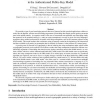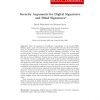68 search results - page 12 / 14 » Reconstruction of Attacks against Cryptographic Protocols |
CORR
2006
Springer
13 years 5 months ago
2006
Springer
We consider a type of zero-knowledge protocols that are of interest for their practical applications within networks like the Internet: efficient zero-knowledge arguments of knowl...
ICITS
2009
13 years 3 months ago
2009
In this article, we discuss a naive method of randomness reduction for cryptographic schemes, which replaces the required perfect randomness with output distribution of a computat...
CHES
2010
Springer
13 years 6 months ago
2010
Springer
The need for lightweight (that is, compact, low-power, low-energy) cryptographic hash functions has been repeatedly expressed by application designers, notably for implementing RFI...
SP
2010
IEEE
13 years 9 months ago
2010
IEEE
—EMV is the dominant protocol used for smart card payments worldwide, with over 730 million cards in circulation. Known to bank customers as “Chip and PIN”, it is used in Eur...
JOC
2000
13 years 5 months ago
2000
Abstract. Since the appearance of public-key cryptography in the seminal DiffieHellman paper, many new schemes have been proposed and many have been broken. Thus, the simple fact t...


